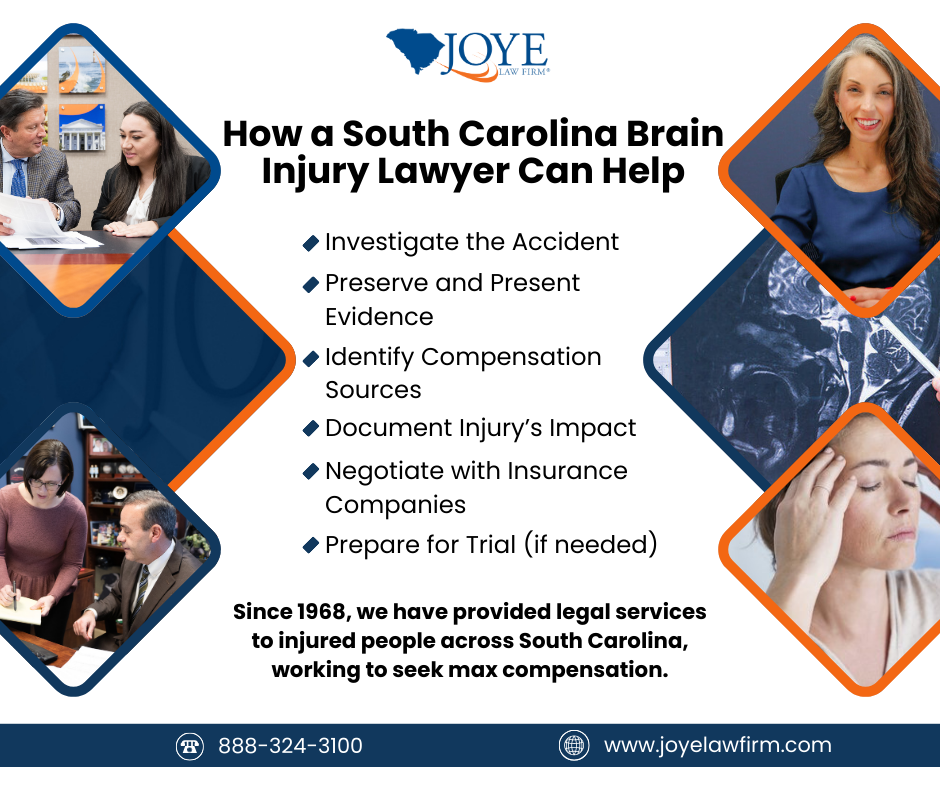
In South Carolina, traumatic brain injuries strike hard. Every year, 12,000 people end up in the ER, 3,000 are hospitalized, and 1,300 are left with lifelong disabilities. Most tragically, nearly 1,000 lives are cut short, making brain injuries the top killer of residents ages 1 to 44. Today, 61,000 South Carolinians are living with permanent disabilities caused by brain injury. These aren’t just numbers. They’re families, futures, and lives forever changed.
Joye Law Firm Injury Lawyers has stood up for injured people in South Carolina since 1968. Our traumatic brain injury lawyers work to hold negligent parties accountable and secure maximum compensation for brain injury victims. We understand that no two brain injury cases are the same, and each requires careful attention to both medical and legal interventions. Our goal is to help clients secure the resources they need for the personal injury claims process to move forward with dignity and stability.
How a South Carolina Brain Injury Lawyer Can Help
Having a skilled South Carolina brain injury lawyer on your side can make a difference in the outcome of your case. Our clients are backed by a team of award-winning attorneys who are recognized as leaders in the field. For example, Attorney Melissa Mosier is a member of the National Traumatic Brain Injury Association. These accomplishments reflect our dedication to bringing both knowledge and leadership to every case we handle. We’ll guide you through each step, from investigating the accident to securing maximum compensation, with a focus on thorough preparation and caring client support.
- Investigating the Accident: Gather facts, witness statements, and official reports to show how negligent parties caused the injury.
- Identifying Compensation Sources: Review all possible insurance coverage and liable parties to maximize available recovery.
- Documenting the Injury’s Impact: Work with medical professionals to show how the injury affects brain function, daily life, and the victim’s future needs.
- Preserving and Presenting Evidence: Collect medical records, photographs, and accident-related documents to support your brain injury case.
- Negotiating with Insurance Companies: Manage communications and counter tactics aimed at reducing payouts.
- Preparing for Trial if Needed: Build a case for court when a fair settlement cannot be reached.
- Drawing on Proven Legal Experience: Since 1968, Joye Law Firm Injury Lawyers has successfully provided legal services to injured people across South Carolina, working to seek maximum compensation for brain injury victims.
Joye Law Firm Injury Lawyers Brain Injury Case Study: $1.35 Million Settlement for Motorcyclist After Lancaster County Collision
On a Tuesday evening in October, a 35-year-old Edgemoor resident’s ride home turned into a nightmare when an SUV pulled into his path, causing a violent collision with his motorcycle at approximately 45 mph. Despite wearing full protective gear, the impact shattered the SUV’s windshield and passenger window, ejecting the rider nearly 20 yards from the crash site.
Emergency responders found him in severe pain and shock, with a Glasgow Coma Scale score of 9, indicating a moderate traumatic brain injury. At Atrium Health in Charlotte, doctors discovered a subdural hematoma, a fractured wrist requiring surgical repair, rib and thoracic spine fractures, and spinal stenosis. Occupational therapy assessments revealed serious cognitive impairments in memory, sequencing, and problem-solving, and he required assistance with even basic personal care.
Following his hospital stay, he entered intensive rehabilitation at Carolinas Rehabilitation, needing round-the-clock care to support nutrition, skin integrity, and mobility. Through determined advocacy by Attorney Sydney Lynn and Case Manager Jamie Ross of Joye Law Firm Injury Lawyers, the client received a $1.35 million settlement, providing critical financial resources for his ongoing treatment, recovery, and quality of life.
What is a Traumatic Brain Injury (TBI)?
The brain is made of neural networks that send messages throughout the body to control functions such as thinking, seeing, hearing, and muscle movement. The soft tissue of the brain is protected by the skull. When the head receives a violent jolt, such as in a car wreck, the brain may slam against the hard interior of the skull. This can damage the neurons and impair brain function, resulting in a TBI.
No two TBI cases are the same. There are many different types of brain injuries, and the effects can be mild to severe. Symptoms vary depending on the cause, location, and severity of the initial trauma.
Often, TBIs go undiagnosed and untreated. A patient can be sent home from the emergency room after a car accident without anyone, including the treating physician, being aware that a severe internal brain injury has occurred. Not until days or weeks later do signs of a serious problem begin to surface.
Between 3.2 million and 5.3 million adults and children nationwide are living with permanent disabilities caused by TBI, according to the American Speech-Language-Hearing Association.
Long-term symptoms of head injuries can include:
- Headaches, including sharp pain in the temples or forehead
- Memory loss
- Difficulty concentrating and maintaining mental focus
- Fatigue, dizziness, and vertigo
- Struggling to find the right words for familiar objects
- Feeling overwhelmed by noise or crowds
- Loss of balance and motor skills
- Blurred vision or clouded eyesight
- Difficulty hearing
- Loss of self-esteem
- Depression, anxiety, or suicidal thoughts
- Death
In severe cases, TBI may lead to heart attacks, loss of bladder control, seizures, epilepsy, dementia, Parkinson’s disease, or Alzheimer’s disease.




